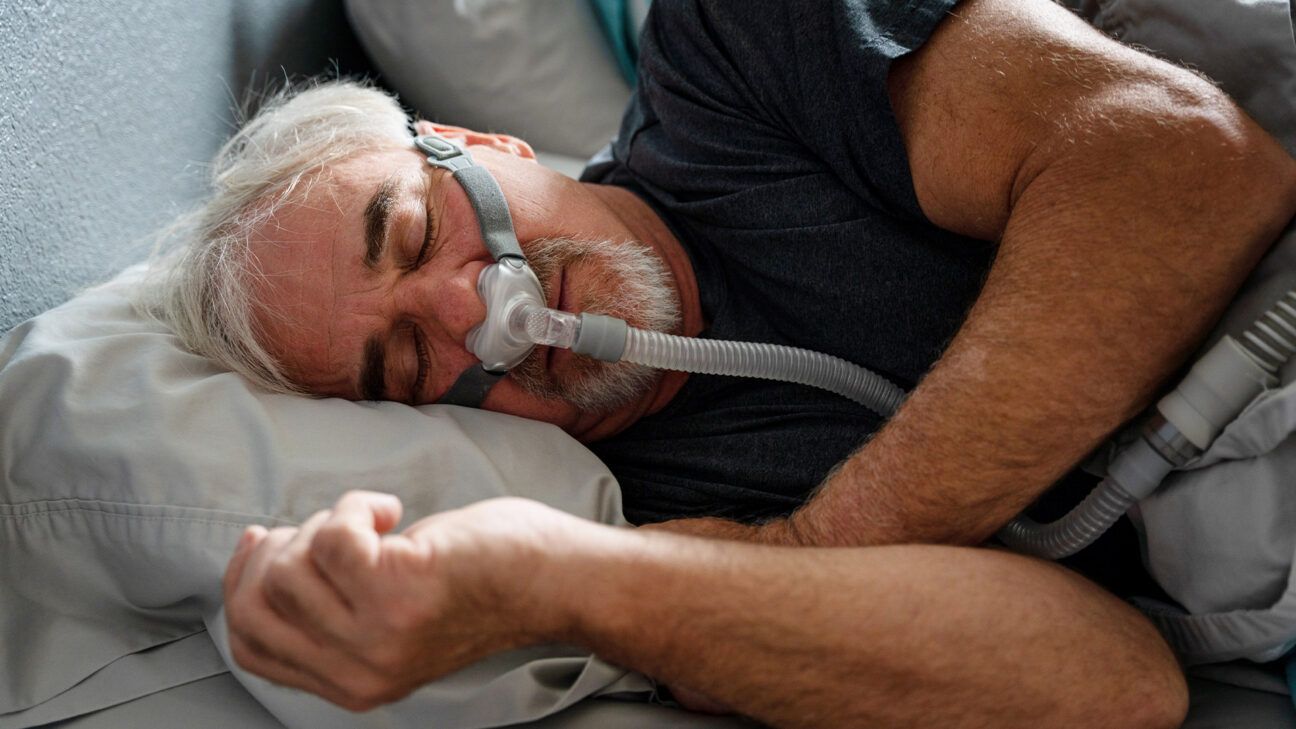
- A new study finds people with sleep apnea may have 50% increased risk of memory or thinking problems.
- It’s unclear if sleep apnea directly causes cognitive deficits or if the issues with attention and memory are linked to comorbidities.
- Scientists suspect the intermittent drops in oxygen, blood flow, and neuroinflammation seen in people with sleep apnea may impair cognitive function.
People with sleep apnea may have a greater risk of developing cognitive issues, according to new research.
The study, which involved over 4,200 people, found that those with sleep apnea were about 50% more likely to have memory and thinking problems compared to those without sleep apnea.
The research will be presented at the American Academy of Neurology’s 76th Annual Meeting April 13-18, 2024.
It’s unclear if sleep apnea directly causes cognitive deficits or if the issues with attention and memory are linked to comorbidities.
Some scientists suspect the intermittent drops in oxygen, abnormal blood flow, and neuroinflammation seen in people with sleep apnea may impair cognitive function.
“The disrupted, poor-quality sleep seen in sleep disorders leads to both acute and chronically worsening changes in the brain,” said Dr. David Merrill, MD, PhD, a geriatric psychiatrist and director of the Pacific Neuroscience Institute’s Pacific Brain Health Center at Providence Saint John’s Health Center in Santa Monica, CA.
Merrill was not involved in the research.
The researchers say the findings highlight the importance of early screening to prevent, detect, and treat cognitive impairment in people with sleep apnea.
The link between sleep and our cognitive health
Sleep — specifically, the quality, quantity, frequency of it — can be both protective or a risk factor for cognitive function, says Merrill.
When people regularly get high-quality sleep, their brain health is protected and enhanced as they age.
A good night’s sleep allows for the repair and restoration of brain function, according to Merrill.
The brain has a specialized cleaning system, the glymphatic system, which gets rid of waste that accumulates during the day.
The glymphatic system is activated during the deepest stages of sleep, he noted.
Without high quality sleep, the brain doesn’t get the opportunity to rest and repair.
“If sleep is chronically disrupted, this can lead to a number of health issues including headaches, fatigue, and memory loss that worsens over time,” Merrill says.
Does sleep apnea directly cause cognitive impairment?
With sleep apnea, a person intermittently stops breathing during their sleep.
There are three types of sleep apnea: central, obstructive, and complex.
With obstructive sleep apnea (OSA), the muscles in the back of the throat overly relax, which prevents normal breathing and potentially dangerous drops in oxygenation of the brain, according to Merrill. Sometimes these tissues can block the airway leading to a choking or snorting sound as the body reacts to the lack of air.
These sleep interruptions can occur dozens of times an hour, causing some people to be severely sleep-deprived.
“Sleep disruptions alone can cause cognitive decline, but the choking episodes also can put a strain on the heart which causes decreased blood flow to the brain,” says Thomas Kilkenny, DO, the director of the Institute of Sleep Medicine at Staten Island University Hospital.
Kilkenny was not involved in the research.
These physiologic events can result in cognitive decline, according to Kilkenny.
“Past meta-analysis studies suggest that conditions found in OSA patients consistently are associated with impairments in attention, memory, executive functions, psychomotor functions, and language ability,” Kilkenny said.
Diagnosing and treating sleep disturbances early is crucial
Sleep disturbances can increase the risk of dementia, and inversely, that dementia can heighten a person’s risk of impaired sleep.
“So, you can end up with sleep worsening memory to the point of dementia, which then worsens sleep,” Merrill says.
The cycle can snowball, which is why it’s crucial to diagnose and treat sleep issues early on, he adds.
Ideally, sleep disturbances can be addressed before any symptoms of cognitive decline appear.
“The hope is that with improved sleep, we can actually delay the age of onset of dementia,” Merrill says.
The use of continuous positive airway pressure (CPAP) machines can prevent the sudden reductions in oxygenation.
As a result, this can protect brain function and decrease cognitive decline.
According to Kilkenny, using a CPAP device for at least one year has also been shown to improve cognition.
“Research studies have shown that even four hours per night using a CPAP device results in significantly less worsening of cognitive decline over time,” Merrill said, noting that there are other solutions for people who can’t wear a CPAP device overnight.
There are many steps people can take to improve their sleep, too.
Having regular sleep and wake times, being exposed to light in the morning, avoiding stimulants like caffeine in the afternoon, and sleeping in a cool, dark room, and avoiding screen time at night can improve sleep duration and quality.
“It’s crucial to use all available strategies to treat sleep symptoms to alleviate dementia symptoms,” says Merrill, and “that includes all the intuitive, but often difficult to achieve, elements of sleep hygiene.”
The bottom line:
People with sleep apnea may have a greater risk of developing cognitive issues, new research suggests. The researchers say the findings highlight the importance of early screening to prevent, detect, and treat cognitive impairment in people with sleep apnea.
